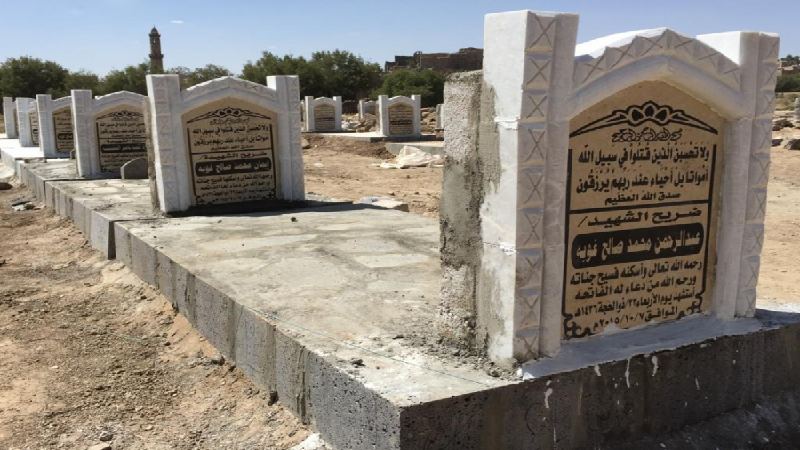They escaped fighting in the port city of Hodeidah, in the west of war-ravaged Yemen, only to find refuge in a graveyard hundreds of kilometres further south.
Currently based in Aden, these 11 internally displaced families do not have enough money to pay for the most basic commodities, and are instead relying on aid and food distributions.
“We have found no shelter except this graveyard. So we have scattered in empty places between graves as we could not bear our hot shelter,” Hassah Ali, one of the people who fled violence in Hodeidah’s Al-Jarrahi district, told Al Jazeera.
READ MORE-Fighting in Aden: Four key questions answered
Hodeidah, a large city on Yemen’s Red Sea coast, has been a battleground between Houthi rebels and a Saudi-UAE alliance military alliance that has been seeking since 2015 to reinstate the internationally recognised government of exiled President Abd Rabbu Mansour Hadi.
Clashes over the past year have prevented aid from reaching the port, where 80 percent of all food for civilians across the country comes through.
Ahmed Yahsoubi, who also fled Hodeidah’s violence along with relatives, sells empty plastic bottles, which he collects from Aden’s streets to provide for his family.
“In most days, we eat from leftover food in garbage,” Yahsoubi said.
“I work all day to collect plastic bottles. At best, I end up with one to two dollars. So we ask for blankets, and a regular food aid,” he said.
In a complicated turn of events and despite technically being part of the same alliance, UAE-backed separatists and troops loyal to Hadi’s government clashed last week, with the fighting killing at least 40 people and wounding 260 others, according to the United Nations.
After days of clashes, the Security Belt – a militia aligned with the UAE-backed Southern Transitional Council (STC) which seeks the secession of the south – took effective controlof various parts of Aden, the temporary seat of Hadi’s government.
The fighting highlighted a rift fracturing the coalition alliance, threatening to open a new front in Yemen’s war. Experts have warned that a secession may undermine UN-led peace efforts and fragile ceasefire agreements.
‘No hope’ for better future
The latest conflict in Yemen, the Arab world’s poorest country, began when the government slashed fuel subsidies in the summer of 2014, prompting angry protests and forcing thousands onto the streets of the capital, Sanaa.
The Houthis seized the opportunity and marched south from their stronghold of Saada province to Sanaa, where they toppled Hadi’s government.
|
|
Concerned by the rise of the Houthis, a US-backed Saudi-UAE military coalition intervened in 2015 with a massive air campaign aimed at reinstalling Hadi’s government.
Since then, data collected by Al Jazeera and the Yemen Data Project has found that more than 18,000 air attacks have been carried out in Yemen, with almost one-third of all bombing missions striking non-military sites.
So far, the conflict has killed tens of thousands of people and pushed the impoverished country to the brink of famine.
According to the UN, more than 2 million Yemen families left their homes since the beginning of the conflict, which has spread to various parts of the country.
In Sanaa, international aid and assistance has failed to sustain those who need it, creating a critical shortage of food, medicine, and medical supplies, among others.
Khalid al-Murshid, who fled fighting in Hodeidah for the capital, found shelter with his family a long-deserted house.
But Murshid said he cannot afford to pay for a medical procedure to save his son’s eyesight.
“I fled the war in Hodeidah because the situation there has become unbearable – especially after I lost my work,” he told Al Jazeera.
“I also came here to treat my son before he loses his sight. But I ended up with no work and with no hope for a better future”.
(Source: Al Jazeera)






 WhatsApp us
WhatsApp us 

